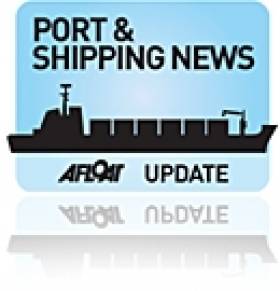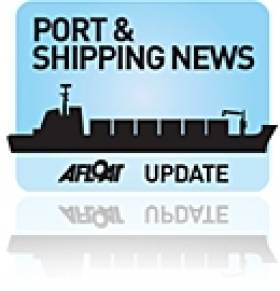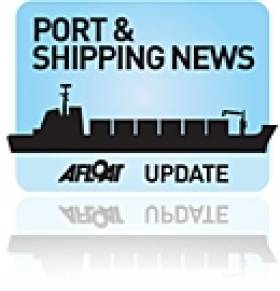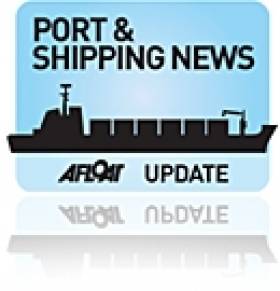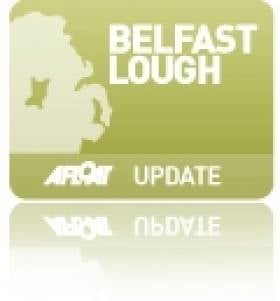Displaying items by tag: Ports Shipping News
IMDO Weekly Review: Irish Manufacturing Surge, Weak N.Europe Shipping Trade, Container Season Wanes
#Ports&Shipping –The latest IMDO Weekly Shipping Market Review includes the following stories as detailed below.
Irish Economy: Surge in Manufacturing - New export orders for Irish manufacturing companies grew in July for the first time in five months. The Investec Manufacturing Purchasing Managers' Index (PMI) increased from 50.3 in June 2013 to 51.0 in July, making it the first rise above the 50 mark dividing growth from contraction since February.
European Shipping: Weak Trade Prospects - The latest global port tracker for North Europe says that trade prospects are not improving despite there being a few short term hopeful signs. This is mainly due to the slowdown in China's growth rate. Experts are predicting that the Northern European market will remain on a downward slope as China's anaemic growth impacts the export scene as much as the recession, which will negate any hope of a peak season.
Container Market: Peak Season on the Wane - The peak season of the east-west trades no longer means a big surge in cargo volumes, ensuring big implications for carriers and shippers according to Drewry. The way that this year's peak season in the Northern Hemisphere is shaping up, ocean carriers should not count too much on a significant revenue boost in 3Q of 2013.
For more of the above and other stories visit the IMDO Weekly Markets Review (Week 31) and also on Afloat.ie's dedicated Ports & Shipping News section.
#IrishShippingSector – Irish based shipping companies in 2012 experienced a challenging year with operations in both the domestic and international shipping markets, according to the Irish Maritime Development Office (IMDO).
Against this turbulent backdrop, the number of vessels being owned, controlled, managed and operated from Ireland remained steady at 340 vessels last year. The IMDO estimate that employment at these firms increased by 5% last year.
A key element in the overall stability of this segment of the Irish maritime sector has been the constant presence of the Irish Tonnage Tax regime which was the introduced in 2002.
Since the scheme began the IMDO has seen a reversal of a previous decline in the indigenous ship owning sector which has been followed by a steady growth and investment programme.
The scheme has gone from approximately 40 vessels to just over 300 vessels, owned, managed and operated by companies located in Ireland.
Latest data indicates that over 56% of the fleet is made up of dry bulk carriers, 21% tanker and 12% container with other Ro/Ro and other specialised vessels making up the remainder of the fleet.
The age profile of the fleet indicates that it is also a modern fleet with 70% of the vessels less than 10 years old and more than 52% under five years.
The industry's growth in Ireland has been driven both by established Irish shipping companies and also by foreign inward investment by overseas firms.
The Tonnage tax has made a positive economic contribution to Ireland and to the shipowning sector in Ireland. It has resulted in the creation of new jobs and investment opportunities for over 600 people and continues to grow.
The IMDO estimate that over €3 billion of shipping assets are managed and controlled from Ireland with more than 100 new direct jobs being created over the last three years alone.
In The Irish Times (dated 24 May) Top 1000 companies in Ireland this included a top 100 transport related companies.
The IMDO analysis indicates that 29 companies listed are engaged in shipping, ports and maritime logistics that had a combined turnover of €4.5bn employing 4700 people. Six Irish Shipping and leasing firms made the top 1000 companies last year.
Ireland Records Success on Maritime Labour Package
#FlagDirective- Minister for Transport, Leo Varadkar has confirmed another successful Irish Presidency trilogue with the European Parliament on the Flag State Directive, which covers marine issues.
The trilogue which involved negotiations between the EU's Council, Commission and Parliament met last week to reach agreement.
"The safety and welfare of those working in the maritime sector is vital. The agreement on the EU Directive on Flag State control, following on from last month's agreement on Port State control, is a key milestone in implementing the Maritime Labour Convention" said Minister Varadkar.
"Ireland has a strong maritime tradition and we are very happy to advance a number of important maritime initiatives during our Presidency. We recently finalised an agreement between Member States and the European Parliament on an EU directive in relation to technical standards for Recreational Water-based Craft which should see improved emission standards and increased competitiveness among European manufacturers.
"We also expect to make significant progress on the revised Marine Equipment Directive, which streamlines and updates procedures for approval of equipment installed on board EU ships, and which is very important for the industry and the functioning of the internal market as well as for safety of EU ships."
The final text agreed of the Trilogue on the Flag State Directive will be presented to Coreper for final endorsement by Member States.
Drifting ‘Ghost' Ship’s Sister Made Historic Call to Drogheda
#GhostShip – As previously reported on Afloat.ie, the 'ghost' ship Lyubov Orlova, which broke its tow-line in the Atlantic more than three weeks ago is a sister of the first cruiseship caller to Drogheda Port, writes Jehan Ashmore.
The small cruiseship, Lyubov Orlova of 4,251 tons was built in Croatia a year before Clipper Adventurer, which made a historic call to the port on the Boyne last year. Clipper Adventurer, which was at one stage the Alla Tarasova and Lyubov Orlova belong to a series of eight sisters built for the Murmansk Shipping Company.
As ice-strenghtened vessels, they are designed to withstand heavy seas while operating as expedition ships, carrying passengers to both the Arctic and the Antarctic.
According to Travel.aol.co.uk, the drifting vessel is some 1,200 (nautical miles) off Galway.
A report in Canadian news service The National Post says that the Irish Coast Guard is examining satellite imagery to ensure the ship can be retrieved before it breaks apart or drifts into shipping lanes.
Responsibility for the vessel has already been disavowed by the Canadian authorities after the vessel, which was being towed from Canada to the Dominican Republic for scrapping, broke loose from its cabling.
AGM of Belfast Harbour
#PORT AGM – The annual general meeting of Belfast Harbour is to take place at the Harbour Office, Corporation Square, during the morning of 23 October between 09.45 -10.45.
As previously reported, Belfast Harbour recently unloaded its single largest ever cargo shipment of 56,000 tonnes of coal, which broke all records to date, over the ports 400 year long history.
According to the port, around 60% of the north's seabourne trade and 20% of the entire island's is handled at the harbour, handling around 17m tonnes of cargo per annum and where approximately 5,500 vessels call each year.


























